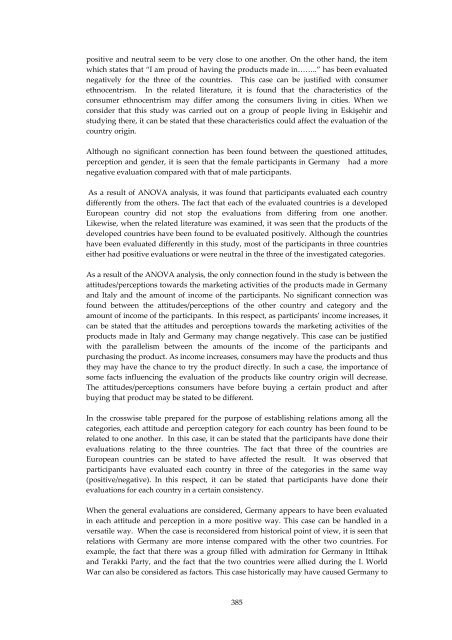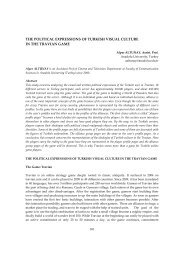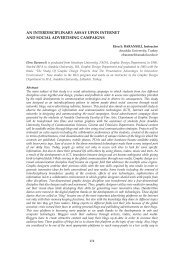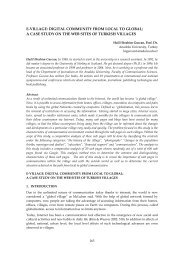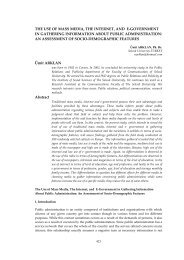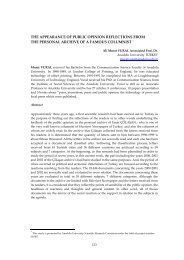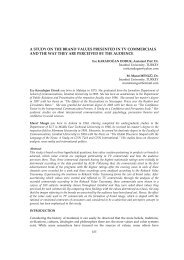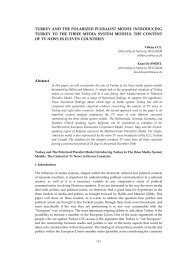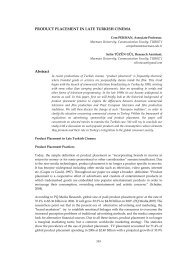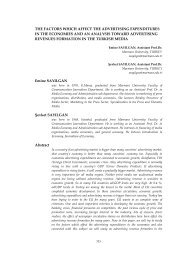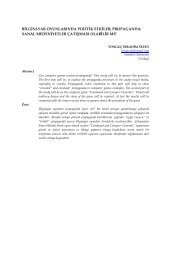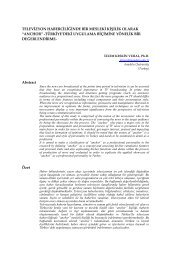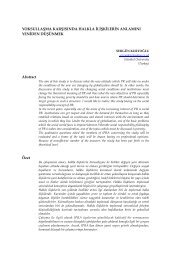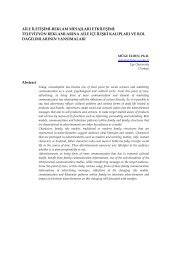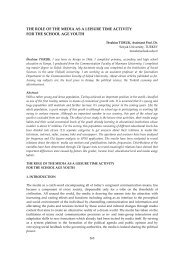the evaluation of turkish consumers' attitudes towards foreign products
the evaluation of turkish consumers' attitudes towards foreign products
the evaluation of turkish consumers' attitudes towards foreign products
Create successful ePaper yourself
Turn your PDF publications into a flip-book with our unique Google optimized e-Paper software.
positive and neutral seem to be very close to one ano<strong>the</strong>r. On <strong>the</strong> o<strong>the</strong>r hand, <strong>the</strong> item<br />
which states that “I am proud <strong>of</strong> having <strong>the</strong> <strong>products</strong> made in……..” has been evaluated<br />
negatively for <strong>the</strong> three <strong>of</strong> <strong>the</strong> countries. This case can be justified with consumer<br />
ethnocentrism. In <strong>the</strong> related literature, it is found that <strong>the</strong> characteristics <strong>of</strong> <strong>the</strong><br />
consumer ethnocentrism may differ among <strong>the</strong> consumers living in cities. When we<br />
consider that this study was carried out on a group <strong>of</strong> people living in Eskişehir and<br />
studying <strong>the</strong>re, it can be stated that <strong>the</strong>se characteristics could affect <strong>the</strong> <strong>evaluation</strong> <strong>of</strong> <strong>the</strong><br />
country origin.<br />
Although no significant connection has been found between <strong>the</strong> questioned <strong>attitudes</strong>,<br />
perception and gender, it is seen that <strong>the</strong> female participants in Germany had a more<br />
negative <strong>evaluation</strong> compared with that <strong>of</strong> male participants.<br />
As a result <strong>of</strong> ANOVA analysis, it was found that participants evaluated each country<br />
differently from <strong>the</strong> o<strong>the</strong>rs. The fact that each <strong>of</strong> <strong>the</strong> evaluated countries is a developed<br />
European country did not stop <strong>the</strong> <strong>evaluation</strong>s from differing from one ano<strong>the</strong>r.<br />
Likewise, when <strong>the</strong> related literature was examined, it was seen that <strong>the</strong> <strong>products</strong> <strong>of</strong> <strong>the</strong><br />
developed countries have been found to be evaluated positively. Although <strong>the</strong> countries<br />
have been evaluated differently in this study, most <strong>of</strong> <strong>the</strong> participants in three countries<br />
ei<strong>the</strong>r had positive <strong>evaluation</strong>s or were neutral in <strong>the</strong> three <strong>of</strong> <strong>the</strong> investigated categories.<br />
As a result <strong>of</strong> <strong>the</strong> ANOVA analysis, <strong>the</strong> only connection found in <strong>the</strong> study is between <strong>the</strong><br />
<strong>attitudes</strong>/perceptions <strong>towards</strong> <strong>the</strong> marketing activities <strong>of</strong> <strong>the</strong> <strong>products</strong> made in Germany<br />
and Italy and <strong>the</strong> amount <strong>of</strong> income <strong>of</strong> <strong>the</strong> participants. No significant connection was<br />
found between <strong>the</strong> <strong>attitudes</strong>/perceptions <strong>of</strong> <strong>the</strong> o<strong>the</strong>r country and category and <strong>the</strong><br />
amount <strong>of</strong> income <strong>of</strong> <strong>the</strong> participants. In this respect, as participants’ income increases, it<br />
can be stated that <strong>the</strong> <strong>attitudes</strong> and perceptions <strong>towards</strong> <strong>the</strong> marketing activities <strong>of</strong> <strong>the</strong><br />
<strong>products</strong> made in Italy and Germany may change negatively. This case can be justified<br />
with <strong>the</strong> parallelism between <strong>the</strong> amounts <strong>of</strong> <strong>the</strong> income <strong>of</strong> <strong>the</strong> participants and<br />
purchasing <strong>the</strong> product. As income increases, consumers may have <strong>the</strong> <strong>products</strong> and thus<br />
<strong>the</strong>y may have <strong>the</strong> chance to try <strong>the</strong> product directly. In such a case, <strong>the</strong> importance <strong>of</strong><br />
some facts influencing <strong>the</strong> <strong>evaluation</strong> <strong>of</strong> <strong>the</strong> <strong>products</strong> like country origin will decrease.<br />
The <strong>attitudes</strong>/perceptions consumers have before buying a certain product and after<br />
buying that product may be stated to be different.<br />
In <strong>the</strong> crosswise table prepared for <strong>the</strong> purpose <strong>of</strong> establishing relations among all <strong>the</strong><br />
categories, each attitude and perception category for each country has been found to be<br />
related to one ano<strong>the</strong>r. In this case, it can be stated that <strong>the</strong> participants have done <strong>the</strong>ir<br />
<strong>evaluation</strong>s relating to <strong>the</strong> three countries. The fact that three <strong>of</strong> <strong>the</strong> countries are<br />
European countries can be stated to have affected <strong>the</strong> result. It was observed that<br />
participants have evaluated each country in three <strong>of</strong> <strong>the</strong> categories in <strong>the</strong> same way<br />
(positive/negative). In this respect, it can be stated that participants have done <strong>the</strong>ir<br />
<strong>evaluation</strong>s for each country in a certain consistency.<br />
When <strong>the</strong> general <strong>evaluation</strong>s are considered, Germany appears to have been evaluated<br />
in each attitude and perception in a more positive way. This case can be handled in a<br />
versatile way. When <strong>the</strong> case is reconsidered from historical point <strong>of</strong> view, it is seen that<br />
relations with Germany are more intense compared with <strong>the</strong> o<strong>the</strong>r two countries. For<br />
example, <strong>the</strong> fact that <strong>the</strong>re was a group filled with admiration for Germany in Ittihak<br />
and Terakki Party, and <strong>the</strong> fact that <strong>the</strong> two countries were allied during <strong>the</strong> I. World<br />
War can also be considered as factors. This case historically may have caused Germany to<br />
385


